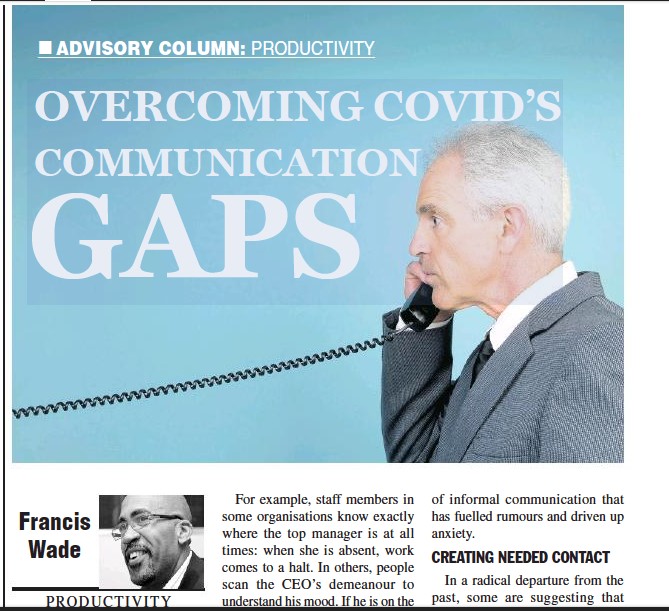As a leader, has the advent of “working from home” distanced you from your employees? As a result, have you witnessed unwanted behaviors? Perhaps you have even realized the unexpected: workers who are actually worse off.
In some companies, we have noticed a surprising phenomenon: Employees who had a good relationship with the organization’s leaders before COVID are now becoming fearful of the same executives. In other words, a certain anxiety has arisen.
It’s led to many staff members working longer and harder, but this added effort doesn’t come from a healthy place. Ultimately, this behaviour does more harm than good because it’s being driven in a way that’s just not sustainable.
The Problem
The average Jamaican worker operates in a perpetual state of low anxiety. The proof? Managers who arrive here from other countries notice talented individuals acting like victims. Furthermore, many of our workers thrive when they migrate to more supportive environments.
On a daily basis, local staff members cope with their fears by developing a heightened sensitivity towards the “Big Man” or “Boss Lady”. Outsiders are shocked to see the deference our employees give to powerful people, going out of their way to elevate and “Big Them Up”.
For example, staff members in some organizations know exactly where the top manager is at all times: when she is absent, work comes to a halt. In others, people scan the CEO’s demeanour to understand his mood. If he is on the warpath, they broadcast the news internally, and warn their colleagues to act accordingly.
But these are all just survival techniques. Our workers developed these habits because executives embody a threat to their well-being. As in slavery, the wrong word from the wrong leader can lead to dire outcomes: public shame, disrespect and separation.
While the exact coping mechanisms vary, their intent is the same: to relieve the state of anxiety. And to some degree, they succeed.
The Pandemic’s Impact
Enter COVID-19 and the mandate to work from afar. Some are thriving: they have escaped the scrutiny of micro-managers and enjoy a fresh freedom to be productive.
However, most are not accustomed to the new disconnection from their organization’s leadership. Now, they are left to their own thoughts and worst fears: a bad thing. Here’s why it happens.
The fact is, the average worker is a social creature: closely linked to other people in the workplace with whom they can share informal interactions all day long. Any scary news or rumors were (before COVID) moderated by the presence of their colleagues, even if no words were passed. At a glance, one could gather critical information by simply observing the environment.
Furthermore, if the CEO happened to walk through the company, staff could feel comforted by her proximity, reducing their anxiety. The quality of her “Good Morning” and the quickness of her pace communicated valuable messages. Questions like “Will I be fired today?” dissipated with her smile.
With new work from home norms (such as Zoom) all these emotional supports have disappeared. In fact, staff is spending more time in meetings than ever before. Perhaps it’s all an effort to compensate for the lack of informal communication which has fueled rumours and driven up anxiety.
Creating the Contact People Need
In a radical departure from the past, some are suggesting that the physical workplace should be retained…but only as a place to socialize. By contrast, an employees’ focused, productive efforts should occur at home, where they are free of distractions. The original purpose of the two locations should be swapped.
But that’s futuristic, post COVID thinking. We can’t follow this prediction today because of the pandemic. What can be done in the meantime?
Some companies have responded by creating informal gatherings between employees. These are opportunities for their people to enjoy each other’s company without a business agenda. Apps like Remo and Airmeets are built for these kinds of interactions, offering far more possibilities than the average meeting software.
However, the most important chats are not with peers, but with superiors. These can be implemented to prevent a rise in anxiety. In spite of busy schedules, some companies are including executives in game nights, cocktail hours, joint training and other gatherings. These are designed, scripted activities (not just random hangouts) which are meant to reduce the emotional distance from bottom to top.
In this context, these informal, but intentional, interactions between leaders and staff serve an important purpose: they help compensate for a cultural challenge in the Jamaican workplace. Together, they provide a way for companies to avoid a predictable spike in employee anxiety in pandemic times. It’s a corporate tactic suited for the distance we’re forced to maintain.

